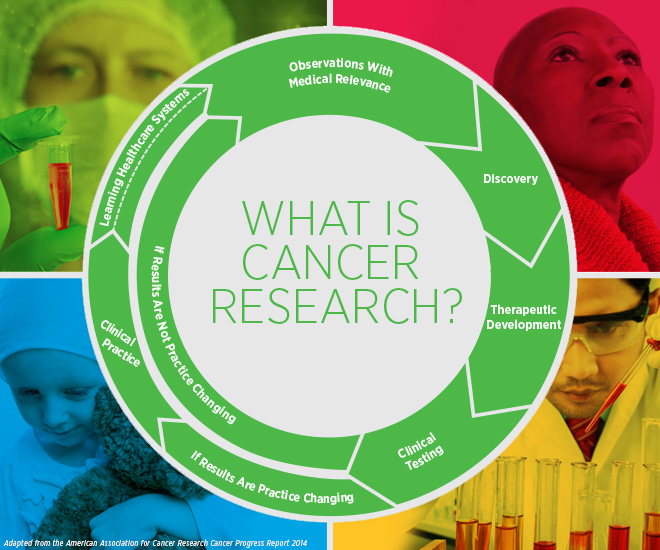Cancer research transforms and saves lives.
The purpose of studying cancer is to develop safe and effective methods to prevent, detect, diagnose, treat, and, ultimately, cure the collections of diseases we call cancer. The study of cancer is called oncology.
Why Cancer Research Is Important
Cancer research is important because the better we understand these diseases, the more progress we will make toward diminishing the tremendous human and economic tolls of cancer.

Research has helped us accumulate extensive knowledge about the biological processes involved in cancer onset, growth, and spread in the body. Those discoveries have led to more effective and targeted treatments and prevention strategies.
Breakthroughs in prevention, early detection, screening, diagnosis, and treatment are often the result of research and discoveries made by scientists in a wide array of disciplines over decades and even generations. Ultimately, cancer research requires partnerships and collaborations involving researchers, clinicians, patients, and others to translate yesterday’s discoveries into today’s advances and tomorrow’s cures.
The Cancer Research Cycle
Research progress is often not linear, but cyclical and ongoing. Advances are the result of constantly building on earlier discoveries and observations.
The research cycle flows from observations with medical relevance to the patient’s bedside and back to the lab. Progress in cancer research depends on the participation of basic and population scientists, physician-scientists, and clinical cancer researchers, as well as patients, their caregivers, and health care providers. Insights from one discipline influence others, and discoveries made in one cancer can offer new ideas to better address others.
Categories of Cancer Research
Cancer research can be divided into several broad categories:
Basic Research
Basic research is the study of animals, cells, molecules, or genes to gain new knowledge about cellular and molecular changes that occur naturally or during the development of a disease. Basic research is also referred to as lab research or preclinical research.
Translational Research
Translational research seeks to accelerate the application of discoveries in the laboratory to clinical practice. This is often referred to as moving advances from bench to bedside.
Clinical Research
Clinical research involves the application of treatments and procedures in patients. Clinical cancer researchers conduct clinical trials, study a particular patient or group of patients, including their behaviors, or use materials from humans, such as blood or tissue samples, to learn about disease, how the healthy body works, or how it responds to treatment.
Population Research
Population research (also known as epidemiological research) is the study of causes and patterns of occurrence of cancer and evaluation of risk. Population scientists, also known as epidemiologists, study the patterns, causes, and effects of health and diseases in defined groups. Population research is highly collaborative and can span the spectrum from basic to clinical research.
